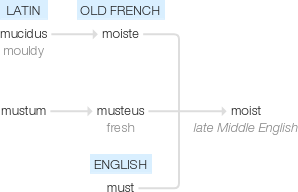Moist
late Middle English: from Old French moiste, based on Latin mucidus ‘mouldy’ (influenced by musteus ‘fresh’, from mustum : see must2).
wiktionary
From Middle English moiste(“moist, wet", also "fresh”), from Anglo-Norman moiste and Middle French moiste(“damp, mouldy, wet”), of obscure origin and formation. Perhaps from a late variant of Latin mūcidus(“slimy, musty”) combined with a reflex of Latin mustum(“must”).
etymonline
moist (adj.)
late 14c., "slightly wet; well-irrigated, characterized by moistness," from Old French moiste "damp, wet, soaked" (13c., Modern French moite), which is of uncertain origin. Perhaps from Vulgar Latin *muscidus "moldy," also "wet," from Latin mucidus "slimy, moldy, musty," from mucus "slime" (see mucus). Alternative etymology [Diez] is from Latin musteus "fresh, green, new," literally "like new wine," from musteum "new wine" (see must (n.1)). If this wasn't the source, it influenced the form of the other word in Old French. Related: Moistly; moistness (mid-14c.).
